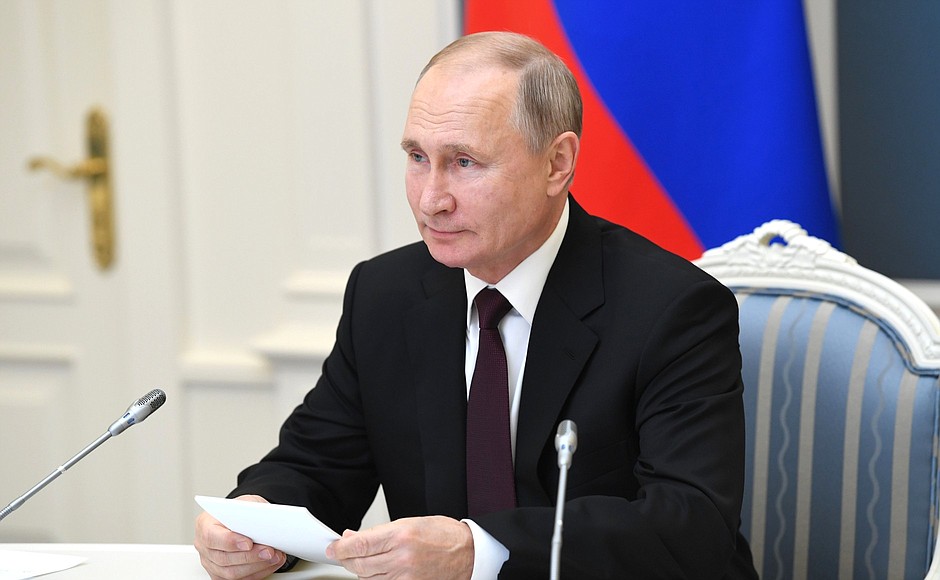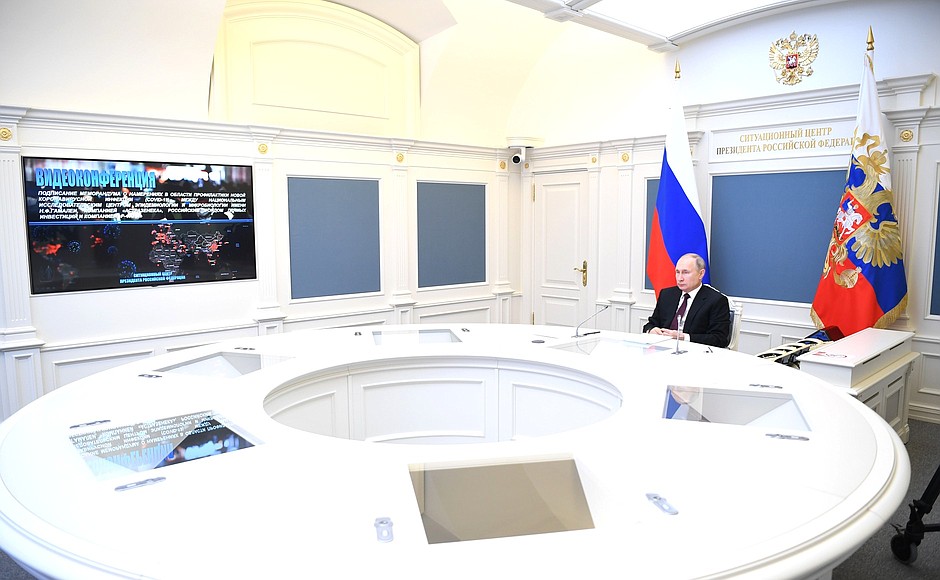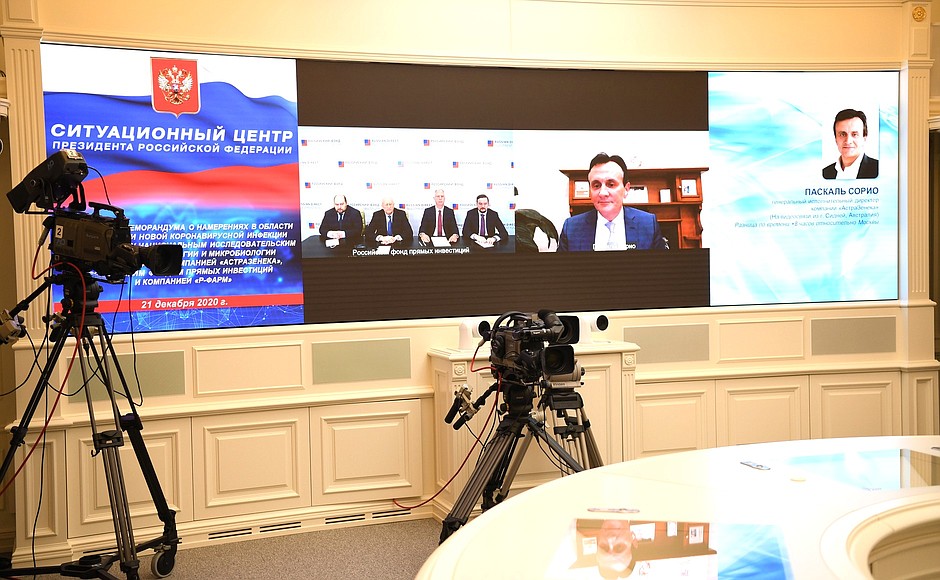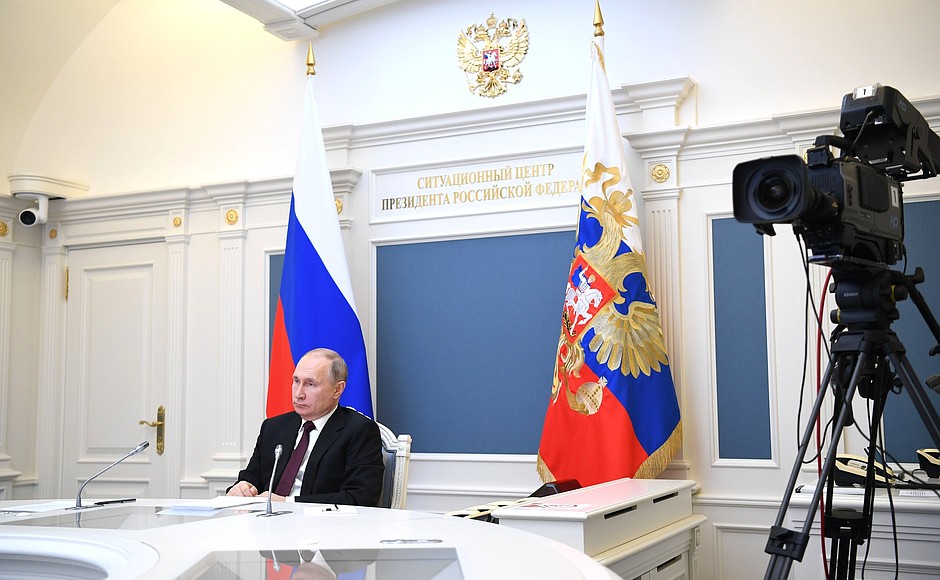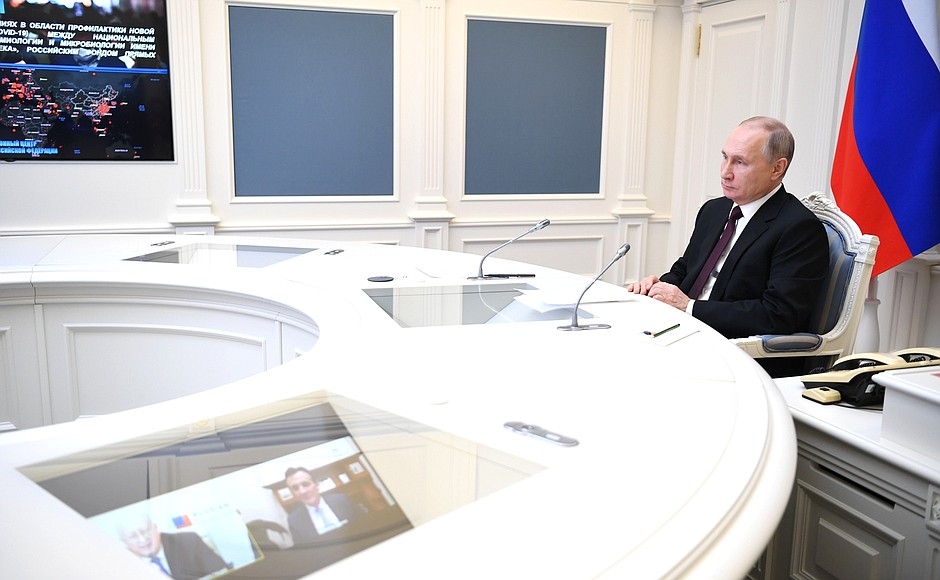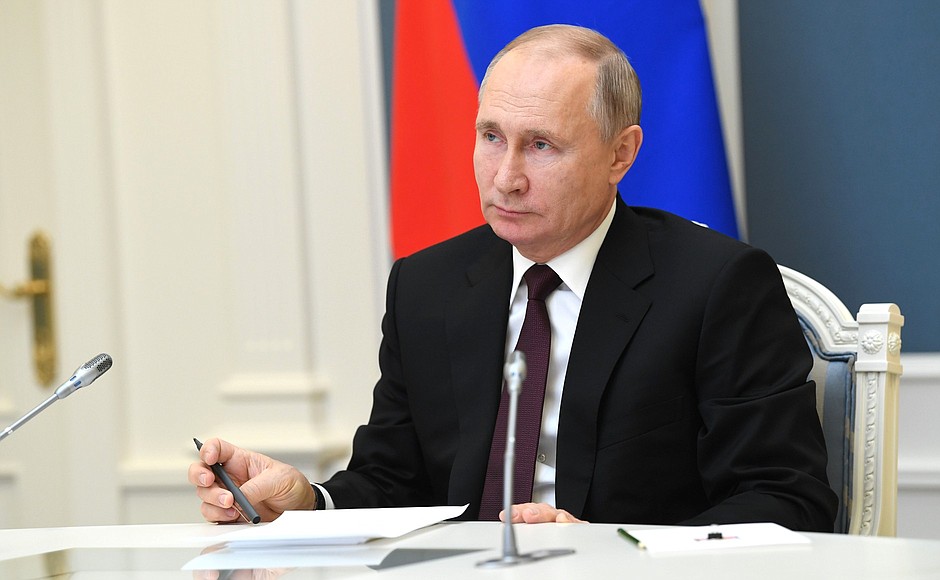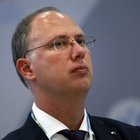The meeting was attended by Director of the Gamaleya National Centre of Epidemiology and Microbiology of the Russian Healthcare Ministry Alexander Gintsburg, CEO of the Russian Direct Investment Fund (RDIF) Kirill Dmitriev, Deputy Director of the Gamaleya National Centre of Epidemiology and Microbiology Denis Logunov, Chairman of the Board of Directors of R-Pharm Alexei Repik, and CEO of AstraZeneca Pascal Soriot.
* * *
President of Russia Vladimir Putin: Good afternoon. I am glad to see you all.
Welcome and congratulations on this significant event, the signing of a memorandum of cooperation.
I am absolutely certain that your commitment to partnership may serve as a compelling example of combining research forces, technologies and investment in order to achieve a common goal, which is to protect the lives, health and safety of millions of people on the planet. Here is what I would like to say. You must have noticed this. My colleagues and I discussed this at length during the G20 summit, a meeting of the leaders of the world’s 20 leading economies. I would like to stress that practically all speakers unanimously agreed that we need to work together to combat the coronavirus. This intention is in fact included in the summit’s final document. In this context, you are doing exactly what the G20 recommended and what the United Nations have repeatedly called for when addressing experts around the world. I am talking about joining efforts.
It is important to use all opportunities that international cooperation offers in order to move as quickly as possible towards the moment when this dangerous infection will finally be defeated. And I am very pleased that Russian specialists, proving their high level of professionalism and scientific expertise, have already made a significant contribution to this common task – they have developed three safe and effective vaccines that can provide a high guarantee of preventing the infection, and in some cases seriously decrease its gravity.
The very first in this series was a vaccine developed by researchers at the Gamaleya Centre with the support of the Russian Direct Investment Fund. I can see all the project participants here, too. The large-scale vaccination campaign already underway in Russia is making use of their invention.
We know that scientists in other countries around the world are also vigorously working on new vaccines. As far as I know, one has been created by AstraZeneca with the University of Oxford. I sincerely greet Mr Pascal Sorio.
To build on these achievements, Russian scientists and our foreign colleagues have made a decision which is based on the principle of an open scientific and professional partnership – and there are no and cannot be any boundaries to that, of course, especially in the current situation.
Just recently, you announced the start of clinical trials to assess the safety and efficacy of the combined use of two vaccines, namely the AstraZeneca and Oxford vaccine and the Russian Sputnik V vaccine from the Gamaleya Centre.
I know that our colleagues in Russia and representatives of AstraZeneca consider this joint programme an essential step in finding the most effective solution to combat the COVID-19 infection. Such cooperation can produce a powerful effect and synergy, both in terms of increasing the efficacy and reliability of the vaccination campaign, of the vaccine itself, and also for its greater availability due to the introduction of various vaccination plans, enabling modern production and logistics, the use of the most advanced industrial facilities in Russia and in other countries.
Today, I am happy to note that it is precisely Russian scientists, our investment companies and representatives of the partner company AstraZeneca that are implementing the World Health Organisation recommendations in real life. Today, you are doing what WHO representatives have repeatedly recommended. They have called for joint action and continue to do so. And you are showing an example of leadership in pooling international efforts and thus bringing victory over this treacherous virus closer.
We sincerely wish every success to all colleagues in all countries. We know that the process is developing with difficulty. We realise that it is necessary to exert the maximum possible effort, while moving along a virtually untrodden road. By the way, this concerns everyone. We can see problems facing our colleagues. It is therefore very important to act hand in hand, being aware of our shared responsibility. We must understand that it is precisely cooperation that can expand on what has already been achieved by certain countries and organisations.
It goes without saying that Russia is ready to pool such efforts and to conduct joint work, especially in those areas which aim to preserve people’s lives and health. In this connection, I would like to note that AstraZeneca has been operating on the Russian market for many years, successfully implementing a number of investment projects. I know that they have even built a factory, and that they are investing in joint research and personnel training projects.
Mr Soriot, we will support this striving on the part of your company and other partners who have been working rather actively in the pharmaceutical sector for a long time in various regions of the Russian Federation. We will do this in every way.
I am confident that cooperation between Russian colleagues and AstraZeneca will make it possible to achieve a breakthrough while working on vaccines and on a number of other vitally important medicines. I know that your company is working in precisely this direction.
In conclusion, I would like to once again congratulate you on signing a memorandum of cooperation and to wish you every success in the joint work. It would be no exaggeration to say that this work is highly important and noble.
Thank you very much.
AstraZeneca CEO Pascal Soriot: Mr President, it is really a great honour to meet you again today, about 18 months after our last meeting in the Kremlin. Back then nobody could have foreseen the COVID-19 pandemic and could have imagined how different the world order would be today.
The pandemic has really taught us that our society is a lot more fragile than we thought. Overcoming this terrible disease requires a global response, not just from the academia, the scientific community, but also from the industry, governments and every single person around the globe.
So I am really pleased to hear you talk about collaboration, global collaboration, also public-private partnerships, because it is only by working together globally that we can actually defeat this terrible disease.
Since early 2020, when the crisis really emerged in China, AstraZeneca committed itself to defeat this disease by bringing our scientific knowledge and expertise together to advance the development of medicines to prevent and treat the virus. We focused our efforts on two fronts. One is the COVID-19 vaccine, and we are also developing a combination of long-acting antibodies that could be used in people who cannot be vaccinated because, for instance, they have immune-depressed diseases, they have, for instance, lupus or some other disease and cannot be vaccinated. Those antibodies last for 12 months and could protect them.
On the vaccine front, we have joined forces, as you have said, with Oxford University, and we have contributed our global expertise in development and global manufacturing. We tried to accelerate the development of this vaccine, but also mobilise partnerships around the world, so we could provide this vaccine to every single person who needs it around the world, guided by a broad and a no-profit approach.
In Russia we have a long-lasting partnership with R-Pharm, and we are good friends with Alexei [Repik] and the R-Pharm team. We decided to transfer the technology to R-Pharm because of the advanced technology core and biopharmaceutical capabilities in Russia. They have developed these capabilities over a number of years, and more recently, importantly, with the support of the Russian Direct Investment Fund. This is another good example of collaboration between organisations and companies.
I would like to congratulate the Russian scientists at the Gamaleya Institute and also the Russian Direct Investment Fund for developing the world’s first registered COVID-19 vaccine, which has more recently demonstrated not only an immune response, but also efficacy and protection against hospitalisations. The approval, of course, has been a clear landmark for this vaccine.
Being able to combine different vaccines is important, because it should improve the flexibility of immunisation programmes. It will allow doctors and nurses to administer the vaccine they want at different times. They will not have to think about which vaccine was given the first time, and they can combine vaccines. This could also improve immunity, could improve efficacy by combining two types of vaccines.
The typical vaccine consists of what is called homologous boosting, which means the first and the second doses are the same vaccine, but combining different vaccines, the so-called heterologous boosting, when the first and second doses of the vaccine are different, we may increase efficacy. This is potentially due to a reduction of neutralising antibodies to the vector itself, but also to the production of broader pool of antibodies due to the different parts of the spark protein that are used as an antigen.
I think that the combination of the Gamaleya vaccine and our vaccine has great promise. Last week we launched a collaboration to understand our respective adenovirus-based vaccines and how they can be combined. We have already begun to plan for a multi-country programme, and it is clear that it will rely on Russia’s clinical capabilities. I think that this is a great collaboration. It will be one of the first of its kind in the world: first collaboration between two vaccine makers. We hope it will enable us to unlock synergies to develop better protection, but also I think that it will stimulate the similar combinations around the world. People will copy this great collaboration, I believe.
I would like to recognise again the strength of Russian science and the great work the Gamaleya Institute has done. It is a real pleasure to join our efforts to save lives around the world, in Russia of course, but also elsewhere around the world.
Mr President, I would like to thank you for your leadership, and also for Russia’s contribution to follow the science and change the course of this devastating pandemic. I look forward to our great collaboration with our colleagues at the Gamaleya Institute, but also with R-Pharm and the Russian Direct Investment Fund.
Thank you.
Vladimir Putin: Pascal, personally, I would like to note your proactive approach to reaching very important and noble goals and not only for your company but, without any exaggeration, for all of humanity. I am referring to protection from the pandemic that has in fact swept the entire world. We see what is happening overseas and in some European countries that are now going back to tough lockdowns, which will certainly affect the economy and the social sphere. You are resolving an extremely important task and in an absolutely open mode, and, I repeat, while following the recommendations of the World Health Organisation (WHO) you are pooling efforts with your Russian colleagues.
I would like to wish you success and not just in the Russian market but also in global markets, and express hope that the new year will be favourable for you and your company and for resolving the tasks that we are discussing now.
Please go ahead, Mr Gintsburg.
Director of the Gamaleya National Centre of Epidemiology and Microbiology of the Russian Healthcare Ministry Alexander Gintsburg: Thank you.
Mr President, colleagues.
The Sputnik V vaccine has passed the first, second and third phases of clinical trials and demonstrated its complete safety, high immunological efficiency and full epidemiological value. This means that out of 30,000 vaccinated volunteers from Moscow none has developed the infection in a medium or severe form and none have required hospitalisation. The picture is entirely different as regards those who received a placebo rather than the vaccine.
At present, over 400,000 vaccine doses or to be more precise, if I am correct, 440,000 doses have been distributed for the public, including today’s data. Another 200,000 doses will be distributed in the next two or three days. If vaccine production is built up on this schedule, and this production technology has been transferred to four facilities inside the Russian Federation, this will guarantee that by November of next year the majority, notably 70 percent of the Russian population will have received the vaccine. This will guarantee herd immunity and make the infection caused by this virus a vaccine preventable disease.
Based on this data, the Russian Direct Investment Fund and the Gamaleya Centre have proposed to the AstraZeneca corporation using one of the two components in the Russian Sputnik vaccine (it consists of two components, as we discussed) to enhance the potential efficiency of the AstraZeneca vaccine.
As far as we know, our colleagues from Oxford, at AstraZeneca, reviewed this proposal from a scientific point of view and assessed it positively. They believe that the vaccine will not only enhance potential immunological efficiency but that it will also extend the protection against the virus if it is based on the combination of two heterologous medications: one medication from AstraZeneka and the other from Sputnik V.
And very soon, almost immediately, the clinical trials will begin. As I understand it, they will not require a large investment and won’t take long simply because the two technical platforms, for the AstraZeneca and Sputnik V vaccines, are very similar. This is why the components that make up part of both vaccines are easily compatible.
Of course, this will allow us to start producing and distributing the vaccine and the vaccination programme, not only in the countries that produce the vaccines, but also in those that have not been able to develop vaccines so far, which will soon result in vaccinating large numbers of people in the world and we expect the infection will become a vaccine-preventable disease, and then the necessary threshold will be reached to protect the planet’s population. This means that the number of those who get the jab will be enough for us to go back to normal lives and start lifting the anti-epidemic restrictions that are now affecting the normal existence of the humankind.
Thank you for your attention.
Vladimir Putin: Mr Gintsburg, I have repeatedly said in public that in my closest circle, there are people who have received the jab and feel perfectly well. Some things that you and Pascal have mentioned are so technical, that for those without the necessary training, it sounds like the Martian language. But I have a simple question. I have seen, and know of one family, for example, two of them are vaccinated, and then are exposed to the virus, and one falls ill with mild symptoms and the other doesn’t. How can this be explained?
Alexander Gintsburg: Mr President, this can be easily explained. The person who doesn’t fall ill has a high level of interferon. Interferon is the protein that is characterised by innate immunity, immunity that was actually discovered by our compatriot Ilya Mechnikov, phagocytosis. In this case, the infection stops at the first phase, the phase of immune response or the phase of phagocytosis. I would say this would not require the use of a specific, or the deeper immunity that the vaccine introduces. This means the person is protected in the first stage of immune response. This is clear and categorical.
As a rule, people who have a normal lifestyle, eat well, sleep well and are not stressed, have this high interferon status. It’s infrequent, but it can happen.
Vladimir Putin: I see. As I said, I have seen several cases where vaccinated people are exposed to the virus under the same conditions, and one falls ill, granted, with really mild symptoms and a day or two later they recover; and the other person does not fall ill at all. Anyway, this shows that the vaccine works and protects people; this is obvious.
Alexander Gintsburg: Thank you.
Vladimir Putin: Let me congratulate you once again. This is an excellent result for your institute.
Please, Mr Dmitriev, go ahead.
Russian Direct Investment Fund (RDIF) CEO Kirill Dmitriev: Mr President, colleagues,
Mr President, you instructed the RDIF to focus on countering the epidemic, and we used our expertise to find solutions in three areas, each of them vital for saving lives: test kits, antiviral medicine and a vaccine.
As you now, we have invested in the production of rapid and effective test kits, in the production of the first antiviral medicines registered in Russia and one of the world’s two such medicines, as well as in the creation and production of the Sputnik V vaccine. When you established the Russian Direct Investment Fund, you instructed us from the beginning to focus on partnership, which you have just mentioned. The partnership approach you encouraged has allowed us to successfully deal with the creation of the vaccine for the protection of our citizens and people in other countries. Evidence of this partnership approach is the composition of our International Advisory Board, which includes scientists from the United States, Sweden, Germany, Argentina, Croatia and Italy.
We are working in partnership with the world’s leading countries to conduct clinical trials in the UAE, Venezuela and India. Today we can announce that clinical trials have ended successfully in Belarus, where our vaccine has been registered today. Belarus is one of the first countries to register our vaccine.
We are working with producers in India, China, Brazil, the Republic of Korea and other countries to launch the production of Sputnik V beyond Russia. Today, the Prime Minister of Kazakhstan launched the joint production of the Sputnik V vaccine in Kazakhstan. We expect Belarus to start manufacturing finished vaccine doses as soon as the first quarter of 2021. Overall, we hope to produce over 500 million vaccine doses at our facilities outside Russia next year.
Of course, our key priority is to protect Russian citizens, as you instructed, but it is also important to maintain partnership with the countries that would like to buy our vaccine to save their citizens. We will supply the vaccine to them mostly from our manufacturing facilities outside Russia. Deliveries will begin this year.
We are also collaborating with regulatory authorities when it comes to the approval of the Russian vaccine, and we expect to get it approved in several countries as soon as this year. The number of such countries will increase several times over next year. We are pleased to see such high assessment of Russia’s regulatory standards. For example, as the result of our efforts, the lower house of the Brazilian Parliament has adopted a law on the use in Brazil of the vaccine registered in Russia. We believe that this is a very important example, including for other countries which want to save their citizens and trust Russia’s regulatory standards.
Why does this vaccine enjoy such great demand? It is certainly very effective – over 90 percent prevention of the infection and in fact 100 percent prevention of severe cases. It uses a unique technology based on two vectors, and this sets our vaccine apart from others because we use two different vectors in two injections. This is unique and we believe it is more effective than a vaccine that uses the same approach for both injections.
Our platform relies on decades of research, and more than 250 clinical trials have shown its safety. The cost of this vaccine is lower than many other vaccines in overseas markets. Its required storage temperature (+2 – +8 C) allows for convenient logistics. We are grateful to Pascal Soriot of AstraZeneca for the partnership we are announcing today.
Sputnik V remains our main highly effective vaccine, but we also invited AstraZeneca to use one of our vaccine components to create another effective drug. AstraZeneca has accepted the offer from the Russian Direct Investment Fund and the Gamaleya Centre and will soon begin clinical trials of its vaccine in combination with adenovirus serotype 26 from Sputnik in three countries in the CIS and the Middle East. R-Pharm will be one of the sponsors of this study.
We welcome the start of this phase with AstraZeneca. We believe that this will be an example for many other manufacturers – an example of working in partnership, in constructive cooperation, and we are confident that both Sputnik V and the new drug will be included in vaccine portfolios in various countries. The portfolio approach to developing vaccines is what will ensure people’s safety. And this portfolio approach should be based not on politics, but on the efficacy and safety the vaccine shows.
In conclusion, I would like to say that we are also ready for partnership, including with Western countries, as regards, for example, the provision of Sputnik V for those patients who suffer from severe allergies and who cannot use other vaccines because some of them have been reported to cause severe allergic reaction. We are ready to supply Sputnik V to Western countries, including this category of their citizens. We can also confirm that, according to our information, Sputnik V is highly effective against the new virus mutation found in Europe. And, accordingly, it is as effective against the new strain as against previous strains. Sputnik V has already repeatedly shown its effectiveness despite prior mutations in the S protein. And, of course, cooperation with a global pharmaceutical leader like AstraZeneca is important, among other things, in fighting new mutating strains of the coronavirus.
We would like to thank you, Mr President, for your support and continue fight against the coronavirus. In partnership with other companies and countries, our vaccine will continue to save lives, jobs and economies worldwide.
Vladimir Putin: Colleagues, friends,
I am now recalling some events that took place many years ago and had to do with the use of our polio vaccine. It happened in Japan, where the Japanese government doubted that using that vaccine was advisable, that it was effective. But the people realised that, they corrected their leaders, and the vaccine was effectively used in many countries and brought very good results after that.
Today, as we can see, the situation has changed dramatically. Today, we are all talking about the need to join efforts, I have already mentioned this – at the G20 level, and at the United Nations. Everyone agrees that this process will certainly be rewarding, and it is something that really needs to be done today. You have indeed switched from words to action, from calls to the implementation of the projects the whole world, humanity is grappling with today, without any exaggeration. Firstly, I congratulate you on this, and secondly, I express my hope that your cooperation will be a success, and I wish you good luck.
Thank you.
